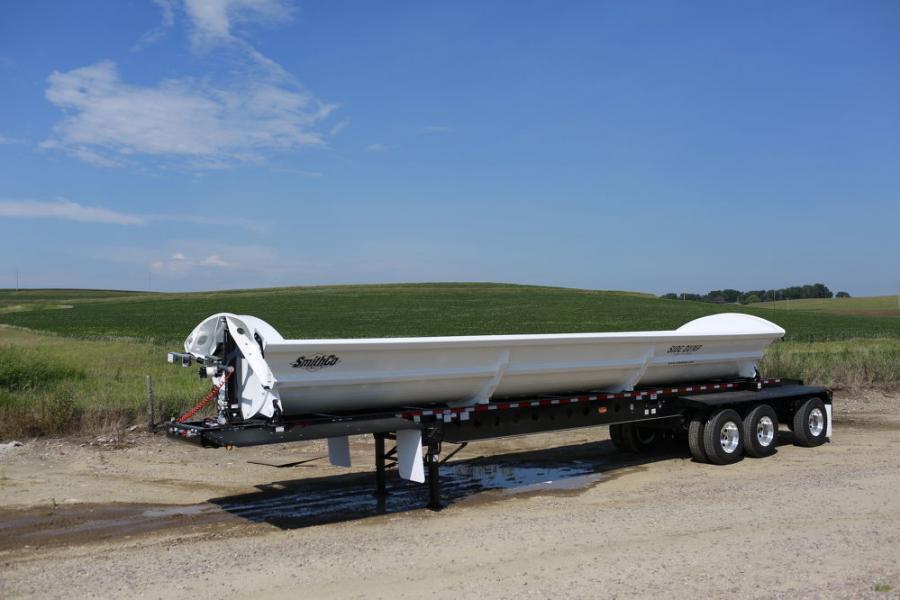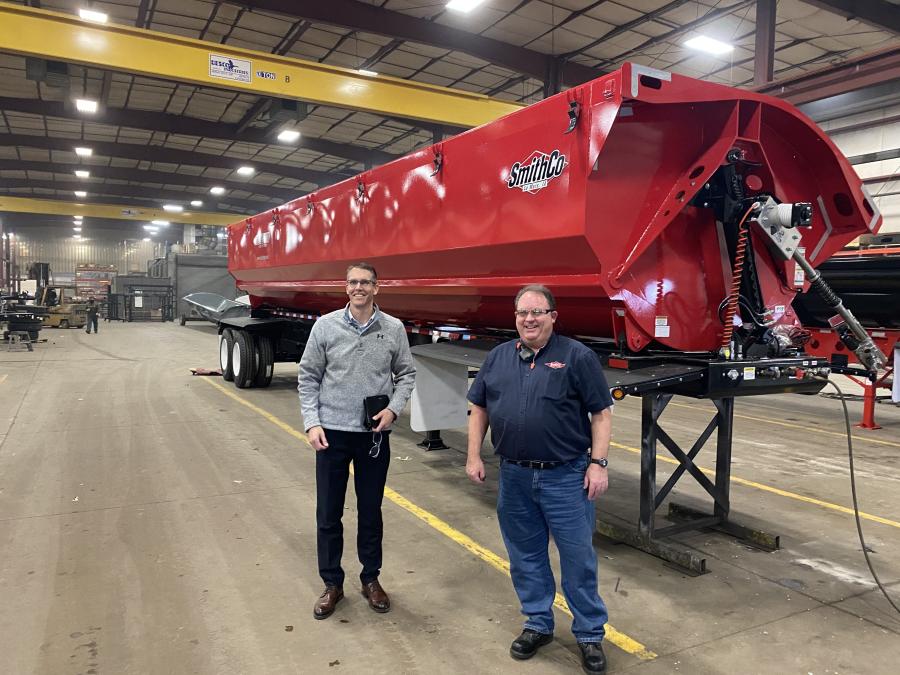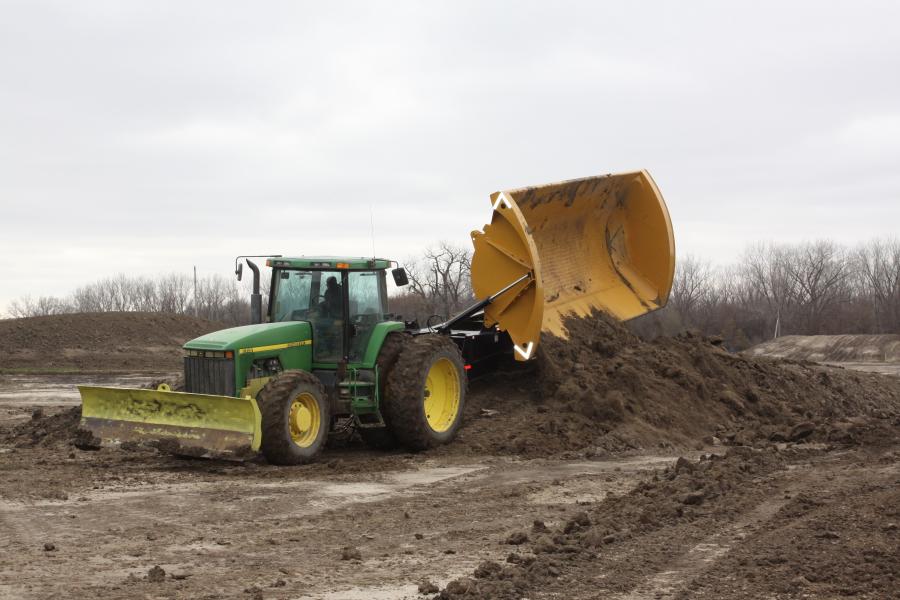
Thu February 25, 2021
Ruksana Hussain - CEG Correspondent
For more than 25 years, side dump trailer specialist SmithCo has been designing and manufacturing industry-leading equipment for the construction, agriculture, waste and demolition and other sectors, providing custom solutions to clients no matter the project requirements or geographical location.
Just the way founder Greg Smith first built a side dump trailer in 1994 in his Le Mars, Iowa, farm shop — creating a solution where he saw a need. Addressing the inefficiencies of the end dump trailers he was working with, Smith improvised upon the side dump trailers he purchased from a company in Oregon. And so was born SmithCo, producing three trailers in the first year of operation with only three employees at the original factory located just south of Le Mars. In 1998, construction began to build the current 70,000-sq.-ft. facility, which now employs more than 100 staff.

Today, the company can produce more than 700 trailers annually, with the capacity to build more than 1,200 if required. All facets of production are undertaken at its manufacturing facility, which also houses a parts department, for components from other vendors and proprietary parts, as well as a repair shop to work on all types of trailers. Same day shipment of in-stock components is offered, though fabricated custom parts can take a week or two. Plans are in the works for expansion to the west of the facility to accommodate a new paint booth and blast booth in response to the company's consistent growth.
Smith retired in March 2019, with ownership moving to Minn.-based Christensen Farms, one of the largest, family-owned pork producers in the United States. Scott Lovell, who has worked at SmithCo in various capacities during a 20-year period, took over as president and CEO.
"What separates SmithCo from the competition is we don't just build trailers, we build solutions," said Lovell. "We have taken a completely different approach where we will design different tub and frame styles to achieve what the customer is trying to accomplish. We pride ourselves on the fact that we are very customer centered, and that has driven us to where we are today and viewed as the industry leader."
Custom solutions require a custom research and development process behind the scenes. At SmithCo, that entails a discussion with its design engineer of 22 years, Jim Verros, whose sole focus is customer-driven concepts.
"Our sales engineer is extremely well-versed in the details surrounding all the different state DOT laws, so we know what the customer can achieve, and we will design the concept to achieve maximum payloads for that state," said Lovell.
The very first products designed that became the core of SmithCo's business are aggregate trailers. Over the years and across the different series and model names, that basic design has changed as the company innovates. Today, it is called the SX Series, encompassing many axle configurations, lengths, materials and other customizable factors. The original intent for the side dump trailers was the construction market, but agricultural, waste, demolition and mining have followed.
The Feedlot Series, developed for feedlot operators to haul manure, has garnered high demand in agriculture and mining. The Construction Pup series for site work also has gained market share, presenting an economical alternative to scrapers and haul trucks, from an acquisitional and operational standpoint.

SmithCo has a huge presence in the western United States and has sold trailers in every state, including Hawaii and Alaska.
Internationally, SmithCo's product lines are in Canada, South America and the Middle East. Shipping costs put a damper on global sales, but Central and South America's mining sector have proved to be viable options for SmithCo to compete with local manufacturers.
A market analysis the company did a few years ago revealed side dumps only hold a 15 percent share of the dump market. That's a whole 85 percent that hasn't experienced SmithCo's custom solutions, yet.
The company employs a marketing approach focusing on Web-based content for those looking for information about side dumps while targeting specific areas within the continental United States where side dumps are a viable option. Efforts include print and digital advertising and hosting demo days with dealers on job sites. SmithCo also provides training to customers on site or through its dealer network.
While the company was having a record production year when the coronavirus pandemic hit, the team proactively went into crisis management mode to ensure the supply chain remained intact.
"We reduced inventory to generate cash because cash is key in those situations," said Lovell. "Our goal was to retain all of our employees and not lay anyone off. We achieved that goal. But after Thanksgiving, the faucet opened up and we got slammed with orders."
The pandemic, however, isn't the first time Lovell has witnessed SmithCo's trials.
"With growth comes growing pains and we are not immune to anything that any other company that grew fast has gone through," he said.
Making sure the infrastructure of the company keeps up with how fast the company grows is always a problem.

"The introduction of an ERP system in 2015 integrating all processes has been a huge benefit to our efficiencies," he said.
An ongoing concern for every manufacturer is dealing with labor needs, and not just hiring, but also retaining the right talent. Another is staying on top of technology and automation so skilled labor and minds can be rechanneled where needed. But 2021 brings forth much optimism and SmithCo has been receiving orders at record levels.
Anticipating challenges as the country reopens for business at the start of this year, Lovell said, "Not letting anything fall through the cracks is going to be vital as we go forward, to make sure we don't run out of components due to supply or delivery issues. It's our goal to maintain our position in the marketplace. We know where we stand and how we are viewed and we take that very seriously and every day strive to maintain it and improve upon what we do." CEG
 Truck and Trailer Equipment
Truck and Trailer Equipment Articles
Articles Sign up for Updates
Sign up for Updates Sell Your Machines
Sell Your Machines

 Truck and Trailer Equipment
Truck and Trailer Equipment Truck and Trailer Dealers
Truck and Trailer Dealers Truck and Trailer Articles
Truck and Trailer Articles Sign up for Updates
Sign up for Updates Sell Your Machines
Sell Your Machines